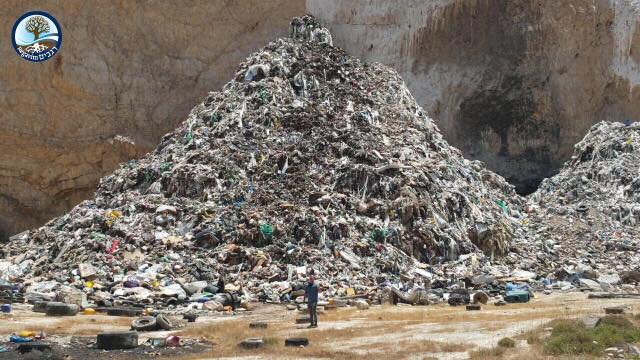According to a recent State Comptroller’s report, unregulated waste burning in the Palestinian Authority has been running rampant for at least 20 years, exposing citizens to toxic pollutants in the air.
By Ben Rappaport, United with Israel
The Knesset State Control Committee last Wednesday held a meeting to address the health hazards of transboundary air pollution stemming from the illegal burning of waste in the Palestinian Authority.
Substitute Committee Chair MK Matti Sarfati Harcavi (Yesh Atid) called the issue “a national crisis.”
“The environmental issue and the issue of waste-burning are at the forefront of the agenda, but in practice, the state has withdrawn from dealing with these issues,” she said.
“Despite the State Comptroller’s report and the pledges made in previous debates, we do not see any change on the ground,” she added. “This meeting reveals that air pollution in Judea and Samaria is not only an environmental problem; it is also a national crisis that demands immediate and comprehensive treatment. We will continue to monitor and fight on this issue.”
According to the State Comptroller’s report, published in March 2024, “uncontrolled and unregulated waste-burning has been occurring in Judea and Samaria for at least 20 years.”
The report noted that such fires “emit many toxic pollutants into the air, exposure to which can lead to health damage, including a burning sensation in the eyes, nose, and throat, headaches, difficulty breathing, chronic respiratory illness, heart disease, neurological problems, and, in extreme cases, immune system impairment, hormonal disruption, and cancer.”
Yuval Hayo of the State Comptroller’s Office said during the meeting that data show the situation to be deteriorating.
“The system has yet to set itself on a track that leads to a solution,” he said, noting that “professionals foresee a much worse situation in the coming years.”
“The government made a decision but failed in its implementation,” he added.
A Ministry of Health official emphasized that health consequences can be severe. “The emission of organic substances that are classified as cancerous substances is significantly affecting the population’s health. The effects range from breathing difficulties to various types of cancer.”
Yaniv Bleicher, director of the Citizens for Clean Air organization, lamented inaction on the issue. “For nine years now we have been trying to deal with the issue of waste-burning in Israel, particularly in Judea and Samaria. We are seeing foot-dragging on the part of all the government ministries.”
Barak Werker, CEO of Green Now, cited worrying statistics. “Since 2015, more than 45,000 people have died from air pollution. At times, the fires burn in places we cannot see. The waste includes oils, scrap car parts – for extracting various metals, domestic waste and animal waste.”
Gilad Ben Ari of the Shomron Cities Association for Environmental Protection called on Israel to “take responsibility rather than wait for the Palestinian Authority to take measures.”
“Transboundary pollution often emanates from both sides,” he said.
Pollution expert Naama Avrahamov raised the issue of dangerous electronic waste.
“Unlike domestic waste, which is burned along the Seam Line, the electronic waste in Israel reaches Judea and Samaria with almost no supervision. These are dangerous substances that impact the health of the entire population,” she said.
Amihai Rahamim, deputy head of the Mateh Binyamin Regional Council, said Israel has to “take the reins.”
“The State of Israel passed the responsibility to the Palestinian Authority, but in practice, the Authority is not taking any action. Israel must take the reins and handle these hazards itself,” he concluded.
